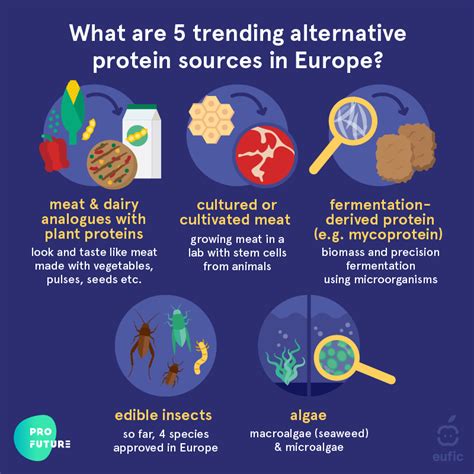The food industry is on the cusp of a revolution, driven by the growing demand for sustainable, healthy, and environmentally friendly products. At the forefront of this transformation is the rise of alternative proteins, which are poised to shape the future of food technology in profound ways. In this article, we will explore five ways alternative proteins will impact the food industry and the benefits they offer.
The Rise of Alternative Proteins
Traditional livestock farming is a significant contributor to greenhouse gas emissions, deforestation, and water pollution. As the global population continues to grow, the demand for protein-rich foods is increasing, putting a strain on the environment. Alternative proteins, such as plant-based proteins, insect-based proteins, and lab-grown meat, offer a sustainable solution to this problem. These innovative protein sources are not only better for the environment but also provide numerous health benefits and are more cost-effective.

1. Reduced Environmental Impact
Animal agriculture is a significant contributor to greenhouse gas emissions, with beef and lamb production being the largest contributors. Alternative proteins, on the other hand, have a significantly lower environmental impact. Plant-based proteins, such as pea protein and soy protein, require less water and land to produce, making them a more sustainable option. Insect-based proteins, such as cricket protein, have an even lower environmental impact, requiring minimal water and land to produce.
Benefits of Alternative Proteins
• Lower greenhouse gas emissions • Reduced water usage • Less land required for production • Lower risk of antibiotic resistance

2. Improved Human Health
Alternative proteins offer numerous health benefits, making them an attractive option for health-conscious consumers. Plant-based proteins are rich in fiber, vitamins, and minerals, and are lower in saturated fat and cholesterol compared to traditional meat products. Insect-based proteins are high in protein and micronutrients, making them a nutritious addition to a balanced diet.
Health Benefits of Alternative Proteins
• Lower risk of heart disease • Reduced risk of type 2 diabetes • Lower risk of certain types of cancer • Improved gut health

3. Increased Food Security
The global population is projected to reach 9.7 billion by 2050, putting a strain on the world's food resources. Alternative proteins offer a sustainable solution to this problem, providing a reliable source of protein for a growing population. Insect-based proteins, in particular, are a promising solution, as they can be produced on a large scale and require minimal resources.
Benefits of Alternative Proteins for Food Security
• Reliable source of protein • Increased food availability • Improved food access • Reduced risk of food insecurity

4. New Business Opportunities
The rise of alternative proteins presents new business opportunities for entrepreneurs and investors. The alternative protein market is expected to grow significantly in the coming years, driven by increasing demand for sustainable and healthy food products. Companies that invest in alternative protein production and processing are well-positioned to capitalize on this trend.
Benefits of Alternative Proteins for Business
• Growing market demand • Increased revenue potential • New business opportunities • Competitive advantage

5. Improved Animal Welfare
Animal agriculture is a significant contributor to animal suffering, with many animals raised in inhumane conditions. Alternative proteins offer a solution to this problem, providing a humane and sustainable source of protein. Lab-grown meat, in particular, offers a promising solution, as it eliminates the need for animal slaughter and reduces the risk of animal cruelty.
Benefits of Alternative Proteins for Animal Welfare
• Reduced animal suffering • Improved animal welfare • Elimination of animal slaughter • Reduced risk of animal cruelty

Gallery of Alternative Proteins





Frequently Asked Questions
What are alternative proteins?
+Alternative proteins are protein sources that are not derived from traditional livestock farming. Examples include plant-based proteins, insect-based proteins, and lab-grown meat.
Why are alternative proteins important?
+Alternative proteins are important because they offer a sustainable solution to the environmental, health, and animal welfare problems associated with traditional livestock farming.
How can I incorporate alternative proteins into my diet?
+You can incorporate alternative proteins into your diet by trying plant-based protein sources, such as tofu and tempeh, or insect-based protein sources, such as cricket protein powder.
In conclusion, alternative proteins are a game-changer for the food industry, offering a sustainable, healthy, and environmentally friendly solution to traditional livestock farming. As the demand for alternative proteins continues to grow, we can expect to see new business opportunities, improved animal welfare, and a reduced environmental impact. Whether you're a consumer, entrepreneur, or investor, alternative proteins are definitely worth exploring.
